“By launching the strategy, you mean send out the PowerPoint slides, right?”
“It was a solid plan, but we struggled to get traction.”
“Can someone send me the PowerPoint with the strategy from back in January? I need to update my goals in the HR system.”
If you’ve ever said any of these words, then you know the challenge that comes with strategy.
A challenge that every single company that is beyond 500 or 1000 people has experienced.
Simply put, it’s the struggle of executing the strategic plan.
Most companies’ strategy lives in PowerPoint or Excel and in almost all cases, by six months into the new strategy, they have abandoned it. Nobody engages with the strategy except to update their progress once per year.
That is actually true for every company I’ve worked at and probably every strategy I’ve worked on as a leader as well.
But, even if the company doesn't abandon it, it ends up generalizing it so much that it becomes irrelevant. They end up saying, “We focused on customers, we focused on process, we focused on financials, and we focused on people.” Those are four things that describe every commercial business out there. They’re essentially describing the Balanced Scorecard framework and call that a strategy.
Balanced Scorecard is not a strategy.
Balanced Scorecard is a diagnosing tool that helps you develop your strategy.
If you treat the tool as your strategy, it won’t do anything unique for your company.
So, as someone who’s been involved in hundreds of strategies and seen tens of thousands of plans on our platform, I want to reveal some misconceptions about strategy that impede execution.
1. Strategy is conceptual, separate from daily operations.
There is a disconnect between what people talk about and what they actually do with their time on a day-to-day basis. They talk about the goals and ambitions of their strategic plan, but their daily activities don’t always contribute to the strategy.
There is a huge gap between operations and strategy.
For some companies, it's endemic to the point where they've actually created complete strategy functions that exist outside of their business operations. Functions that have their own set of goals, systems and ideas. The greater the ideas they come up with, the more successful they consider themselves. Like that’s their job, to create great ideas.
That couldn’t be further from the truth.
Strategy is not something separate, a parallel thing or something that lives on top of everything. It doesn’t make sense to be like that. Strategy has to be the framework of what you do throughout the whole organization.
Strategy is what you do every day.
Not one hour per week.
Every hour of every day.
You can’t execute a strategy if you spend one hour on it and the rest of the time, it’s business as usual.
2. Suits own strategy
Executives, consultants and heads of strategy.
Strategy belongs to them.
And lower-level employees should not be concerned with it.
It sounds reasonable, but here’s the problem with it. When your people see themselves as subordinate to that centralized strategy process, they choose not to be involved at all. They treat it as something separate from their work. They say, “Let me know when you need me. In the meantime, I’ll just be working.” As if strategy is something that intrudes on their work and interrupts it.
However, 70% of what a business does is actually correct.
By linking it to the strategy, though, you bring motivation to that 70%. You help people prioritize and focus on the 70%. You encourage that broader level of engagement in not just what they're doing but in the company’s goals overall.
By involving your people in the strategy process, you let them own a part of it. And whenever people have ownership of something, they take care of it.
3. Strategy is planning
No.
Strategy is not planning.
Planning is a part of strategy. Strategy is about execution. And business as usual is execution. Strategy should not be something you do occasionally.
Strategy can’t take a backseat when COVID hits. You can’t stop doing strategy when something unexpected happens. Quite the contrary. That’s exactly when you need strategy the most. If you spend one hour per week on strategy, you’re effectively saying that you spend 97.5% of your time not executing effectively.
The truth is that 95% of large corporations are in that position. Why?
Because a lot of these companies don't need to be strategically successful to maintain the status quo.
If you’re Bank of America or HSBC, do you really need to execute a good strategy to deliver your revenue figures or grow them by 5 or 10%? You actually don't. Because you're in a position where maybe competition is not that strong or maybe people need your product so much that they're willing to pay large amounts of money and not ask questions about fees and charges.
But that's true, for as long as it's not true.
As soon as PayPal comes, as soon as a new bank comes, as soon as crypto comes, you are completely dead. And you have no path to recovery for two reasons.
First, you do not have innovative products because you've never innovated on your strategy or effectively delivered your strategy. Second, you don't have a culture of adaptability, a culture of strategy execution. So trying to turn around that giant steamship is virtually impossible.
These companies put themselves at risk.
Take, for example, the car industry and the rise of Tesla. It’s a perfect illustration.
There's no way someone like Tesla should have been able to disrupt that industry so effectively and become the world's most valuable car manufacturer. Especially when you consider how few Teslas roam the street. (Do you know anyone with a Tesla? I don't.)
But they're the number one car company in the world by valuation.
Why? Because they execute on a strategy efficiently, which for them is not just about cars. It's not just about marketing, climate change, manufacturing, diversification or using the same batteries in cars, as they do in solar systems and houses. It's about creating a new category and aligning everything within that context.
That's what effective strategy execution looks like.
And that's what it could do to these large corporations that don't have it in their DNA and never did.
Create new opportunities, develop adaptable cultures and respond to existential threats.
In short, solve the strategy challenge.



.avif)


.png)
.jpg)
.jpg)



